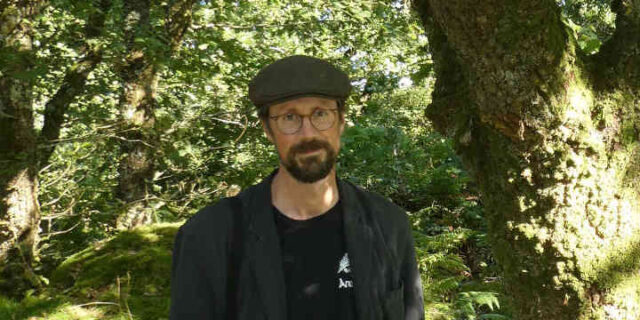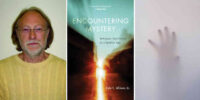Paul Kingsnorth is a successful English writer (novels and non-fiction), journalist and editor. His life so far (he is 51) is a fascinating story with many twists and turns in his beliefs and the causes he works for.
It is likely that, no matter what you believe, you’ll find things somewhere in his journey that you’ll agree with and other places where you’ll disagree strongly.
Journalism and protest
Paul studied modern history at Oxford. It was there that he became involved in environmental protests, being arrested at least once for chaining himself to a bridge as part of a protest against a road that locals felt was unnecessary. He also edited a student newspaper.
This experience led him into working as a journalist on a national newspaper. When he found that work “frivolous and uninspiring” he left to work for several different environmental organisations, mostly doing journalistic work.
Wider and deeper
Kingsnorth began to see other issues as deeply important.
He was one of the founders of the Free West Papua Campaign, aimed at freeing Papua and West Papua from Indonesian colonisation.
He was instrumental in forming the Dark Mountain Project, a network of people challenging some of the assumptions of contemporary western civilisation and questioning the idea of progress.
One of Dark Mountain’s key themes is that science and technology will be unable to avert climate change and the world is headed for an apocalypse. He isn’t a climate change denier, but rather a climate action pessimist.
Globalisation and the forces of development, privatization, and conglomeration became another target. He felt globalisation has played a part in destroying historic cultures around the world by a process of homogenisation.
As he thought through these issues, Kingsnorth abandoned journalism and wrote non-fiction books and essays about globalisation and then novels on apocalyptic themes of “environmental collapse, the rise of artificial intelligence, and the destructive conflict between the individual and the collective”.
Then in recent years he has become concerned about how Covid isolation and vaccination became (in his view) a tool of control by governments using smartphones and digital monitoring. He fears that as climate change has more and more catastrophic effects, that control will only increase and become more tyrannical.
A spiritual turnaround
Paul had grown up in a secular household and a secular world. Religion was no more than a superstition “we in the modern world had long grown out of”. At school he learned the basic stories (parables and nativity) and forms (Lord’s Prayer, hymns) of Christianity, but this information only strengthened his view that Christianity was “authoritarian …. superstitious …. feeble” and “dying a much-needed death at the hands of progress and reason”. From his teen years he was an atheist.
But his love of the outdoors and “the intense wonder and mystery of the natural world” led him to a sense of awe. A feeling of “some deep, old power rolling through it all”. And thus a deep sense of the destruction wrought on the natural world by humanity.
He began to think that all the ancient religions had tapped into something important – about human nature and the dangers “when our reach exceeds our grasp”.
Where to find truth?
So he began a search to find the truth behind religious belief and spirituality. He knew he wanted something serious, with tradition. And he knew it couldn’t be Christianity with its “dominate and subdue” approach to the natural world.
So he tried Buddhism, and practiced it for a few years. But in the end, he found Zen didn’t satisfy him. “It was full of compassion, but it lacked love. It lacked something else too …. I wanted to worship.”
He had found God in nature, so he thought the next thing to try was paganism and wicca. He found himself out in the woods, “worshipping a nature goddess under the stars”. It was fun, he found, and it made things happen. Magic is real, he decided.
But then he started having dreams. One night he had a vivid dream of Jesus, so real he was able to write down what Jesus said and draw how he looked. He didn’t want Christianity to be true, but he felt he had to investigate it next.
The hound of heaven?
Suddenly he started coming across Christians everywhere. He began to feel hunted. He didn’t want to respond ….. or did he?
Then one night, as he was about to participate in a pagan ritual, he became violently ill. He felt he should not be part of the ritual. Then came a time when he was at a concert at his son’s school when he was “overcome with a huge and inexplicable love, a great wave of empathy, for everyone and everything.”
Immediately he knew Christianity was true and he had become a Christian. It wasn’t rational, he says, but it made more sense of the world and human nature than materialism did.
He was reluctant to join a church – he sees himself as more of a loner, and he felt no attraction to the Catholic Church or the Church of England. But he found in the Romanian Orthodox Church “a central ritual of deep and inexplicable power …. a mystical path, an ancient and rooted thing, pointing to a world in which the divine is not absent but everywhere present”. And so, almost three years ago, he was baptised into that church.
And while he retains is pessimism about the future of western civilisation and the world, he sees Jesus’ teachings as “the most radical in history, and that no empire could be built by those who truly lived them.”
“if we were to follow the teachings we were given at such great cost—the radical humility, the blessings upon the meek, the love of neighbor and enemy, the woe unto those who are rich, the last who will be first—above all, if we were to stumble toward the Creator with love and awe, then creation itself would not now be groaning under our weight.”
“In the Kingdom of Man, the seas are ribboned with plastic, the forests are burning, the cities bulge with billionaires and tented camps, and still we kneel before the idol of the great god Economy as it grows and grows like a cancer cell. And what if this ancient faith is not an obstacle after all, but a way through?”
Food for thought
I found plenty to think about in Paul’s story:
- Is a purely rational response the correct or only way to approach the big questions of life? How do we assess a feeling that something makes more sense than other ways of seeing?
- Accepting the scientific truth of climate change, is it reasonable to give up working towards solutions because we don’t think those in power will do enough? Or should we do our best even if it won’t be enough?
- Is he right that capitalism is a major cause of wars, climate inaction and dehumanisation? If so, what should be our response?
- If the world is headed for an apocalypse, what should be our repsonse? Is there a danger of fearfully over-reacting?
Read more
- Paul KIngsnorth in Wikipedia.
- The Cross and the Machine, Paul KIngsnorth, First Things, June 2021.
- Paul Kingsnorth on environmentalism, converting to Christianity and his concerns about authoritarianism, Theos, September 2022.
Photo from Paul’s Substack The Abbey of Misrule.
You may also like these
Feedback on this page
Comment on this topic or leave a note on the Guest book to let me know you’ve visited.




